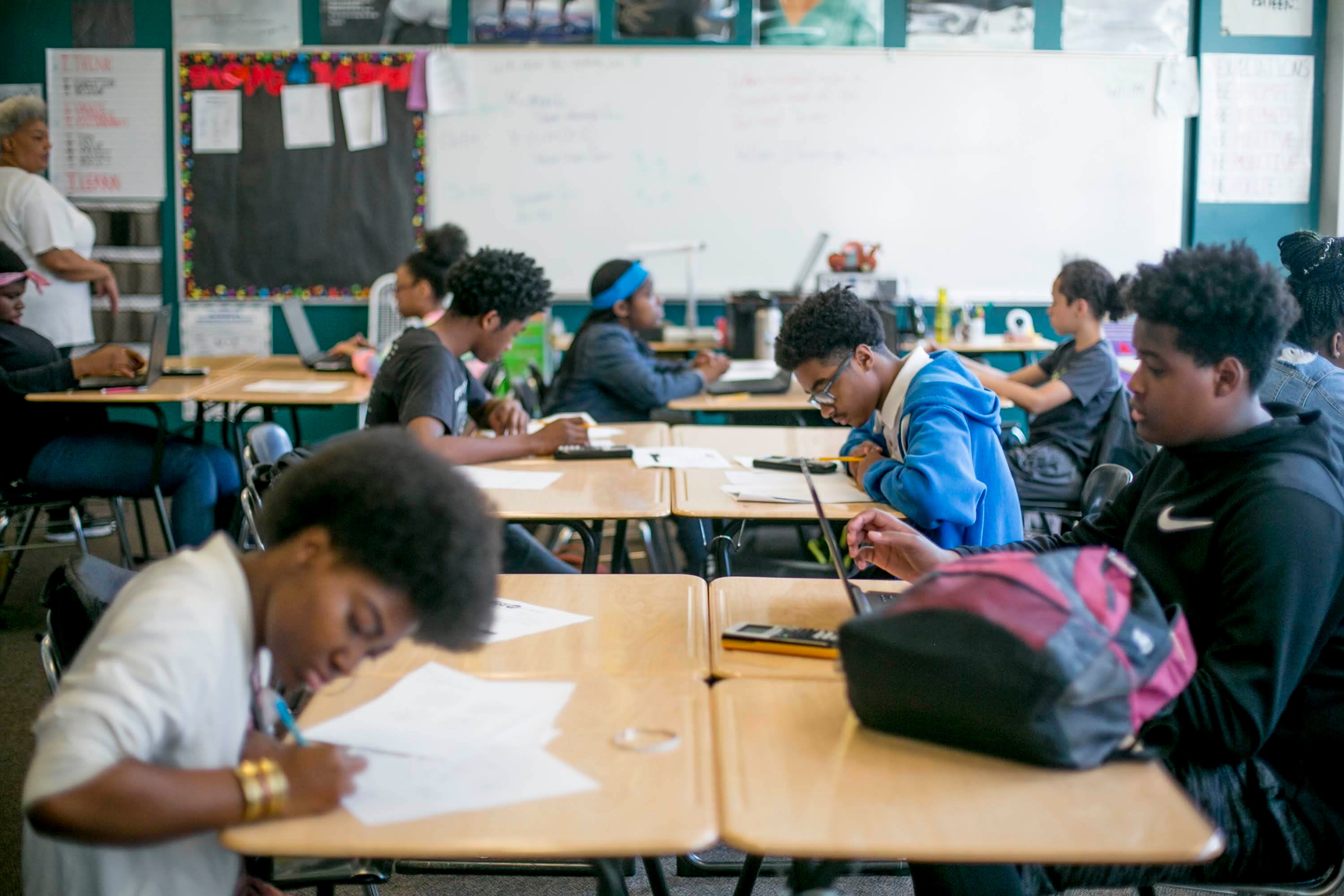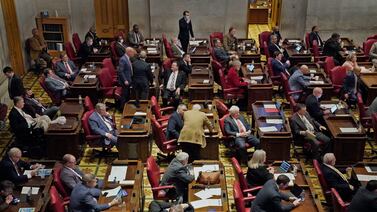A new Republican-backed bill would sharply limit Michigan classroom discussions of how race and racism have shaped American history.
Under the legislation introduced Thursday, K-12 districts would lose 5% of their funding if educators teach critical race theory, “anti-American” ideas about race in America, or material from The 1619 Project, a New York Times initiative that puts Black history and the consequences of slavery at the center of the U.S. national narrative.
The Michigan legislation is the latest Republican-led effort to restrict how history is taught in public schools, part of a backlash against efforts heightened by the past year’s racial reckoning to more fully recognize how race and racism have shaped the country’s history and current events.
The fate of the Michigan bill, which has no Democratic sponsors, is unclear. While Republicans control both chambers of the state legislature, the governor, Gretchen Whitmer, is a Democrat. Her office did not immediately respond to a request for comment about the bill.
The bill hammers another wedge into a national schism over race in America. That divide widened in recent months after the on-camera killings of George Floyd, Daunte Wright, and Adam Toledo by police, which sparked protests and prompted more Americans to recognize that people of color face more barriers in the U.S. than white people.
Even as lawmakers in some parts of the country pushed schools to talk more about the history of race in America, numerous Republican-led states, borrowing language from former President Donald Trump, are attempting to limit those discussions.
It is not clear whether any Michigan schools are actually teaching critical race theory, a field of study more typically found at the college level that delves into race relations in the U.S. and how racism, bias, and historic inequities influence people and policies. Some Michigan teachers are using curriculum based on The 1619 Project, although it’s unclear how many.
Sen. Erika Geiss, a Democrat and member of the Michigan Legislative Black Caucus, said Republican sponsors of the Michigan bill are attempting to obscure the history of race in America.
“We do a disservice to our future leaders, to the students we are growing and educating, by not telling them about things that were horrific in U.S. history,” said Geiss, who represents suburban communities outside of Detroit. “How can we do better if we just sweep it under the rug?”
Sen. Lana Theis, Republican chair of the Senate education committee, said in a statement that the bill would put a check on “‘woke’ proponents” of critical race theory who “reject our country’s true history and our founding principles, in favor of an identity-based cultural Marxist ideology.”
“We should not ignore the past sins of our nation, especially things as abhorrent as slavery and Jim Crow, nor should we allow the history we teach our children to be distorted and politicized by an ideological and historically inaccurate agenda,” she added.
Marc James, a social studies teacher at Communication and Media Arts High School in Detroit, who is white, said he has issues with The 1619 Project and critical race theory and would not teach them as gospel. But he said the GOP bill is problematic because it would limit what he can say in the classroom.
“I think that I ought to have the autonomy in my classroom to provide both sides of the story, and to say that things are not so simple,” he said.
K-12 schools have long served as a flashpoint in debates about race in America. In 2018, conservative lawmakers in Michigan sparked a heated debate over the state’s social studies standards when they attempted, among other changes, to reduce the prominence of the NAACP, a longstanding civil rights organization, in the state’s history classes.
After George Floyd’s murder, many students around the country pointed out that history classes didn’t pay enough attention to Black American history. Some Democratic-controlled legislatures, including in Minnesota and New Jersey, sought to expand students’ access to lessons in ethnic studies and diversity and inclusion.
The Republican backlash against these measures was fueled by Trump, who slammed The 1619 Project and critical race theory while in office and signed an executive order forbidding federal contractors from conducting racial sensitivity trainings that promote “divisive concepts” such as the idea that “the United States is fundamentally racist.”
That order was later repealed by President Joe Biden, but the same language shows up in the bill restricting discussions of race in schools across the county. Lawmakers in West Virginia, Georgia, Tennessee, Texas, Missouri, Iowa, New Hampshire, Rhode Island and Oklahoma have advanced similar proposals.
Racial divisions are especially pronounced in Michigan, a state with a large Black voting bloc and a state legislature that has been dominated for a decade by an almost all-white Republican party.
Over the last year, Michigan made national headlines as a hotbed of white nationalist militia activity. Early in the pandemic, members of these groups armed with semi-automatic rifles attempted to break into the state capitol building during a protest of Whitmer’s mask orders. Some of the same people allegedly attempted to kidnap Whitmer.
Top Michigan lawmakers condemned the protests, but later appeared at rallies with white nationalist figures.
Dale Zorn, a co-sponsor of the critical race theory bill, was photographed in Lansing last spring wearing a mask that looked like the Confederate flag. He later apologized.
Zorn and other cosponsors of the bill did not respond to a request for comment.
While some states have threatened to punish educators who teach critical race theory, Michigan and others want to withhold a substantial amount of funding from any district where such lessons occur.
“What galls me is that it’s so sweeping,” said Sen. Dayna Polehanki, a Democrat. “I guess if a teacher says African-Americans as a race have been fundamentally oppressed, historically, your school loses 5% of its funding. That’s unbelievably scary.”
The Michigan bill has yet to be scheduled for a committee hearing. The state Legislature works full time and is scheduled to be in session through at least the end of June.








